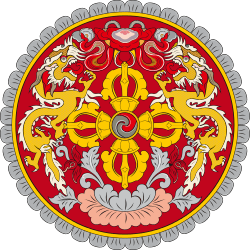Independence of Bhutan
Bhutan is one of the few countries which has been independent throughout majority of its history. It has never conquered, occupied, or governed by an outside power for most of its history, and has remained relatively isolated. Although there have been speculation that it was under the rule of the Kamarupa Kingdom or the Tibetan Empire in the 7th to 9th centuries, there is only substantial evidence. The country has continuously and successfully defended its sovereignty throughout history.[1][2]
In 1910 under the Treaty of Punakha, Bhutan recognized the suzerainty of the British government in exchange for political autonomy.
Thus Bhutan doesn't have an Independence Day because it was never under anyone's rule.
References
- ↑ Rose, Leo E. (1977). The Politics of Bhutan. Ithaca: Cornell University Press. p. 24. ISBN 0-8014-0909-8.
[T]here can be no doubt that since at least the tenth century no external power has controlled Bhutan, although there have been periods when various of its neighbors have been able to exert a strong cultural and/or political influence there.
- ↑ Aris, Michael (2005). The Raven Crown: The Origins of Buddhist Monarchy in Bhutan. Chicago: Serindia Publications. p. 15. ISBN 1-932476-21-0.
peripheral to the great empire of power and faith [i.e., Tibet], yet never subjugated to it.
This article is issued from Wikipedia - version of the 8/8/2016. The text is available under the Creative Commons Attribution/Share Alike but additional terms may apply for the media files.
